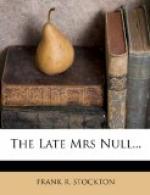“I never did see,” said the pensive neighbor on the brogan case, “how such things do git twisted. It was only yesterday that I met a man at Tyson’s Mill, who’d just come over from the Valley, and he said he’d seen this Mr Noles over thar. He’s a hoss doctor, and he’s going up through all the farms along thar.”
“I reckon when he gits up as fur as he wants to go,” said the man on the starch boxes, “he’ll come here and settle fur awhile.”
“That won’t be so much help to the old lady,” said the storekeeper, “for it wouldn’t pay to keep a neffy-in-law just to doctor one sorrel horse and a pa’r o’ oxen.”
“I reckon his wife must be ‘spectin’ him,” said the man on the brogan case, “from her comin’ after fancy vittles.”
“If he do come,” said the stout, elderly neighbor, “I wish you’d let me know, Tom Peckett, fur my black mar has got a hitch in her shoulder I can’t understand, and I’d like him to look at her.”
The storekeeper smiled at the pensive man, and the pensive man smiled back at the storekeeper. “You needn’t trouble yourself about that young woman’s husband,” said Mr Peckett. “There’ll be a horse doctor coming along afore you know it, and he’ll attend to that old mar of yourn without chargin’ you a cent.”
CHAPTER XXI.
The second afternoon of Lawrence Croft’s confinement in the little building in Mrs Keswick’s yard, passed drearily enough. The sky retained its sombre covering of clouds, and the rain came down in a melancholy, capricious way, as if it were tears shed by a child who was crying because it was bad. The monotony of the slowly moving hours was broken only by a very brief visit from the old lady, who was going somewhere in the covered spring wagon, and who looked in, before she started, to see if her patient wanted anything; and by the arrival of a bundle of old novels sent by Mrs Null. These books Lawrence looked over with indifferent interest, hoping to find one among them that was not a love story, but he was disappointed. They were all based upon, and most of them permeated with, the tender passion, and Lawrence was not in the mood for reading about that sort of thing. A person afflicted with a disease is not apt to find agreeable occupation in reading hospital reports upon his particular ailment.
The novels were put aside, and although Lawrence felt that he had smoked almost too much during that day, he was about to light another cigar, when he heard a carriage drive into the yard. Turning to the window he saw a barouche, evidently a hired one, drawn by a pair of horses, very lean and bony, but with their heads reined up so high that they had an appearance of considerable spirit, and driven by a colored man, sitting upon a very elevated seat, with a jaunty air and a well-worn whip. The carriage drove over the grass to the front of the house—there was no roadway in the yard, the short, crisp, tough




